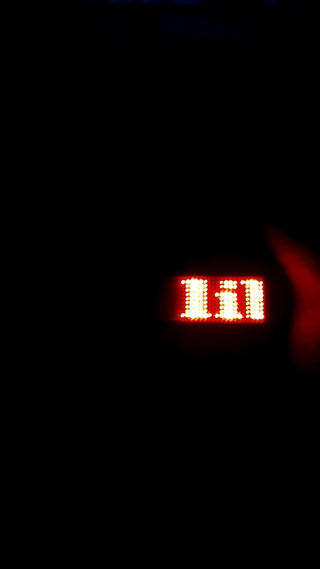LS32 LCD name badge + Rust
Dec 13, 2020During 36c3 last year the FOSSASIA assembly was selling some cheap bluetooth LCD name badges and I got one as to have something to fiddle with during the night at the hotel. There were a couple of demo units in the assembly and the people selling the badges encouraged everyone to try pairing their phones (via bluetooth) to the demo units before purchasing, as some phones weren't able to pair with the badges. When I was next in line to purchase one, I was asked if I wanted to try one of the demo units in case it doesn't work and I replied something along the line "If it doesn't work, I'll make it work", which made people in the line laugh. As it turns out, neither of the two phones I had access to paired with the badge, so it came down to figuring out how this thing worked and what other ways there were to program it.
Badge identification and making it work on OpenBSD while on 36c3
The badge is most likely this one, but it came without a CD, packaging or USB cable. 11x44 single color LEDs (red in my case), two buttons and a micro USB port is all we get.
Plugging the badge into a computer makes it light up and start charging with a cute animation of a battery and a coffee mug. Running dmesg we get:
input: LSicroelectronics LS32 Custm HID as
/devices/pci0000:00/0000:00:01.2/usb1/
1-1/1-1:1.0/0003:0416:5020.001B/input/input32
hid-generic 0003:0416:5020.001B: input,hidraw0:
USB HID v1.10 Device [LSicroelectronics LS32 Custm HID]
on usb-0000:00:01.2-1/input0and usb-devices:
P: Vendor=0416 ProdID=5020 Rev=00.00
S: Manufacturer=LSicroelectronics
S: Product=LS32 Custm HIDwhich was enough information to go searching for software that would potentially allow me to program the badge from the USB port. When searching I found out that older displays were using a USB-to-Serial mode to be programmed, while the one I had purchased, exposed itself as a HID device. Eventually I ran into this python project on GitHub that according to the README should work with my device. Now my only problem was that I only had my OpenBSD laptop with me and the project didn't work out of the box with it. Unfortunately, it's been almost a year since then and I don't recall what changes I had to make for it to work, but based on some chat logs from back then it seems that:
- I made some small changes to the hidapi library (something along the lines of this iirc) to work in OpenBSD (and pyhidapi?)
- Configured the kernel without uhidev support or something close to that (not sure if this was needed after changing the hidapi lib)
This was enough to make it work and have scrolling text on the badge!

libreops.cc scrolling on the LCD badge
By that point it was almost 3AM, so I went to bed in order to wake up for the next day of CCC.
Rust + HIDAPI
During December of 2019, the excellent On the Metal podcast was airing and I didn't miss a single episode, so when I got back from CCC I was eager to develop something using Rust and in particular work on something "low-level", after listening to so many interesting hacking stories.
The state of Rust for embedded development seemed pretty good at the time, but I didn't have a particular project in mind that would benefit from it, so I decided to scratch my own itch and write a CLI to program the LED display. This task wasn't particulalry low-level, but it would invole communicating with hardware and that was good enough for me at the time.
Using HIDAPI as the core library for the HID interfacing made things easy and thankfully there was already a Rust bindings implementation, so the only thing left for me to do was to figure out what kind of messages the display expects and create them in Rust. Once again, people are awesome and Gautier Mechling had reverse engineered the protocol already and documented it.
I wrote a really quick and dirty Rust library and an executable that takes some arguments (the message to show, the brightness of LEDs, if the LEDs should blink or not, etc) and :tada: I could program the display with code I wrote myself and also learned some Rust while doing it! I then abandoned the project and Rust for the next 12 months ^_^.
rc3 and future hacking
As the days for rc3 draw near and since I'm remembering the fun I had in 36c3, I've decided to publish the Rust library (I still have a number of bugs to fix, features and documentation to add, etc) as a way to rekindle my hacking spirit. Tomorrow (after a bit of cleaning up) I plan on releasing the CLI program as well, so stay tuned.
Source: GitHub
